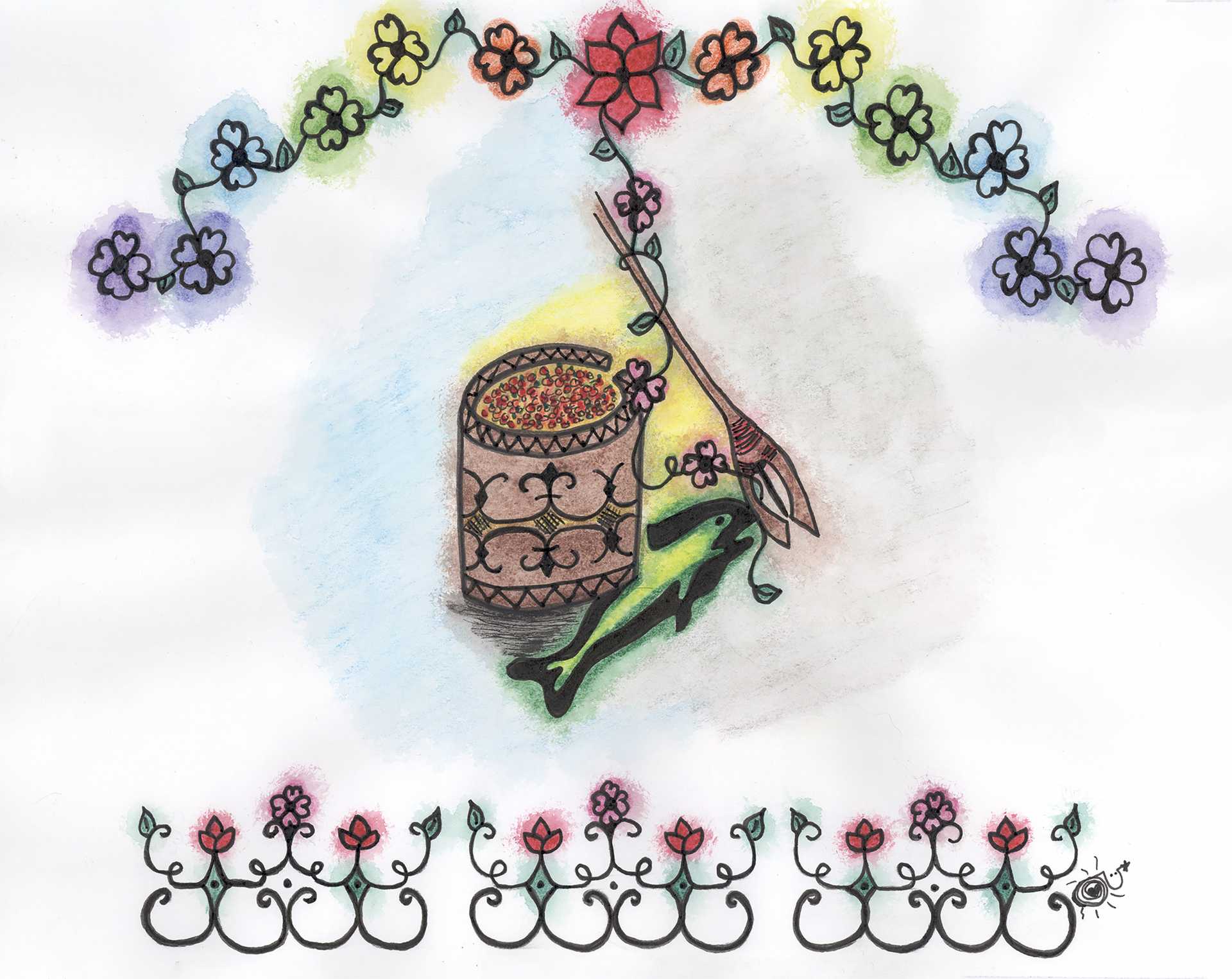


Flowers represent the countless teachings related to Mother Earth’s medicines, of which women are often the traditional guardians. For women, berry-picking occupied several months of the summer. Hunting for salmon using the harpoon at night was the domain of men.
Home / Module 7 / Traditional activities and roles

Wolastoqiyik wikultuponik yut skitkomiq ‘qotamqahk kehsikoton sankihiw wici psi keq amoniw.

The wolastoqey people lived on this earth for thousands of year in total harmony with the nature.
Mecimi yalapasihtit, kansuhsok mecimi-te kotunkahtuwok, amhotuwok naka maqenikhotuwok weci-kisawsultihtit.

As a semi-nomadic nation, our ancestors always had to rely on hunting, fishing and gathering to survive.
'Cel peciw pemkiskahk kehcikotonhaticik ntotehkimkun weci nomihtuweq kcihkul naka sipiyil tahalu kcitpok wetawsultiyeq ipocol psi-te keq milkunen weci kisawsultiyeq.

Even today, we are taught by our elders to see the forests and the rivers as sacred sources of life as they offer everything we need to live.
Aqamok nit kat tehpu wicuhketikonok, kansuhsok nikt.

They are more than ressources, they are our relatives.
Kotunkahtimok, amhotimok naka maqenikhotimok nihtol mecimi-te ntopeltomnen.

Hunting, fishing and gathering are part of our inherent rights.
Tan eci nit ollukhatiyeq nostumonen eli mec wiciyutomeq yut ktahkomiq : Wolastokuk.

When we practice these activities we reaffirm our sacred connection with our territory : the Wolastokuk.
 ⎙
⎙


| ||||||
|---|---|---|---|---|---|---|
| Kotunkahtimok | Chasser | Hunting |

|
|||
| Nuci – kotunket | Chasseur | Hunter |

|
|||
| 'Tawi kotunke. | Il est un bon chasseur. Elle est une bonne chasseuse. | He/She is a good hunter. |

|
|||
| Nmihtaqs ‘tawi kotunke. | Mon père est un bon chasseur. | My dad is a good hunter. |

|
|||
| Nutamet | Pêcheur | Fisherman |

|
|||
| Amhotin | Pêcher | Fishing |

|
|||
| 'Tawame. | Il/Elle est un bon pêcheur / une bonne pêcheuse. | He/She is a good fisherman. |

|
|||
| Nmihtaqs ‘tawame. | Mon père est un bon pêcheur. | My dad is a good fisherman. |

|
|||
| 'Pisun | Médecine | Medicine |

|
|||
| Naci pkonomon 'pisun. | Je m’en vais cueillir de la médecine. | I’m going to pick medicine. |

|
|||
| Posonut | Panier | Basket |

|
|||
| Posonutiyil | Paniers | Baskets |

|
|||
| Nmihtaqs posonutehke. | Mon père fait des paniers. | My dad makes baskets. |

|
| Tokec | Présent | Present tense |


| |||
|---|---|---|---|---|---|---|
| Nkotunk. | Je chasse. | I’m hunting. |

|
|||
| Kotunke. | Il/Elle chasse. | He/She is hunting. |

|
|||
| Kotunkiyik. | Ils/Elles chassent. (2) | They are hunting.(2) |

|
|||
| Kotunkahtuwok. | Ils/Elles chassent. (3+) | They are hunting. (3+) |

|
|||
| Ntotolam. | Je pêche. | I am fishing. |

|
|||
| Ame. | Il/Elle pêche. | He/She is fishing. |

|
|||
| Amiyik. | Ils/Elles pêchent. (2) | They are fishing. (2) |

|
|||
| Amhotuwok. | Ils/Elles pêchent. (3+) | They are fishing. (3+) |

|
|||
| Nposonutehk. | Je fais des paniers. | I make baskets. |

|
|||
| Posonutehke. | Il/Elle fait des paniers. | He/She makes baskets. |

|
|||
| Posonutehkiyik. | Ils/Elles font des paniers. (3+) | They make baskets. (2) |

|
|||
| Posonutehkhotuwok. | Ils/Elles font des paniers. (3+) | They make baskets. (3+) |

|
| Mecimiw | Passé | Past tense |


| |||
|---|---|---|---|---|---|---|
| Ntapi-kotunk. | Je suis allé chasser. | I went hunting. |

|
|||
| Api-kotunkiyik. | Ils/Elles sont allés(es) chasser. (2) | They went hunting. (2) |

|
|||
| Api-kotunkahtuwok. | Ils/Elles sont allés(es) chasser. (3+) | They went hunting. (3+) |

|
|||
| Ntapam. | Je suis allé pêcher. | I went fishing. |

|
|||
| Apame. | Il/Elle est allé(e) pêcher. | He/She went fishing. |

|
|||
| Apamiyik. | Ils/Elles sont allé(e)s pêcher. (2) | They went fishing. (2) |

|
|||
| Apamhotuwok. | Ils/Elles sont allé(e)s pêcher. (3+) | They went fishing. (3+) |

|
|||
| Ntapi-posonutehk. | J’ai fait des paniers. | I made baskets. |

|
|||
| Api-posonutehke | Il/Elle a fait des paniers. | He/She made baskets. |

|
|||
| Api-posonutehkiyik. | Ils/Elles ont fait des paniers. (2) | They made baskets. (2) |

|
|||
| Api-posonutekhotuwok. | Ils/Elles ont fait des paniers. (3+) | They made baskets. (3+) |

|
| Nihkaniw | Futur | Future tense |


| |||
|---|---|---|---|---|---|---|
| Nkoti naci-kotunk. | Je vais chasser. | I’m going to hunt. |

|
|||
| Koti naci kotunkiyik. | Ils/Elles vont chasser. (2) | They are going to hunt. (2) |

|
|||
| Koti naci kotunkatuwok. | Ils/Elles vont chasser. (3+) | They are going to hunt. (3+) |

|
|||
| Nkoti-natam. | Je vais pêcher. | I’m going to fish. |

|
|||
| Koti natame. | Il/Elle va pêcher. | He/She is going to fish. |

|
|||
| Koti natamiyik. | Ils/Elles vont pêcher. (2) | They are going to fish. (2) |

|
|||
| Koti natamhotuwok. | Ils/Elles vont pêcher. (3+) | They are going to fish. (3+) |

|
|||
| Nkoti-naci-posonutehk. | Je vais faire des paniers. | I’m going to make baskets. |

|
|||
| Koti naci posonutehke. | Il/Elle va faire des paniers. | He/She is going to make baskets. |

|
|||
| Koti-naci-posonutehkiyik. | Ils/Elles vont faire des paniers. (2) | They are going to make baskets. (2) |

|
|||
| Koti-naci-posonutekhotuwok. | Ils/Elles vont faire des paniers. (3+) | They are going to make baskets. (3+) |

|
| Kcitomitahatomun eleyimok wici yut ‘komaseyik lipkotenomakoney imiyewakon. | Honorez vos traditions avec cette prière de purification. | Honor your tradition with this smudging prayer. |


| |||
|---|---|---|---|---|---|---|
| Kisiyulinoq | Créateur | Creator |

|
|||
| Mec-op-al yut kpot npehkihtakun litahasuwakonol. | Que la fumée purifie mes pensées. | May this smoke cleanse my thoughts. |

|
|||
| Naka pehkiht nisisqol weci woli nomihtay. | Qu’elle purifie aussi mes yeux pour que je puisse voir avec clareté. | And also cleanse my eyes so that I may see clearly. |

|
|||
| Pehkit ncalokossiyil weci woli nutom. | Purifie mes oreilles pour que je puisse bien entendre. | Cleanse my ears so that I may hear well. |

|
|||
| Pehkit ntun weci wolitaqok psi keq itom. | Purifie ma bouche pour que mes paroles soient bonnes. | Cleanse my mouth so that I may say good things. |

|
|||
| Naka pehkiyan nmoshun welam psi wen nuleyuwa. | Et purifie mon cœur pour que je puisse être bon envers les autres. | And cleanse my heart so that I may be good to others. |

|
|||
| Nit leyic. | Qu’il en soit ainsi. | So be it. |

|